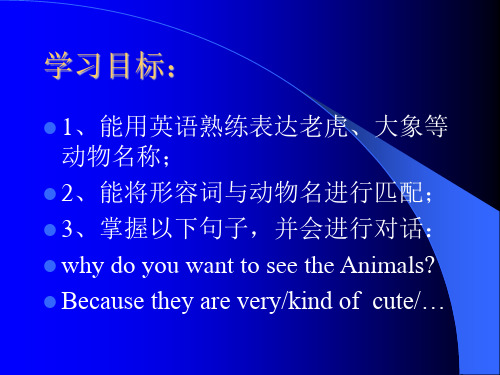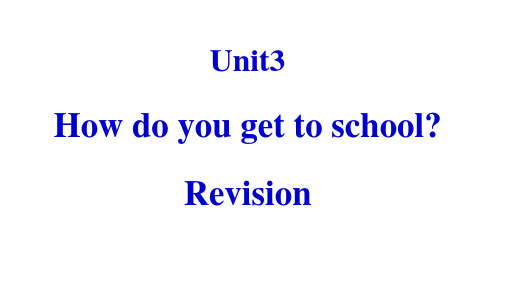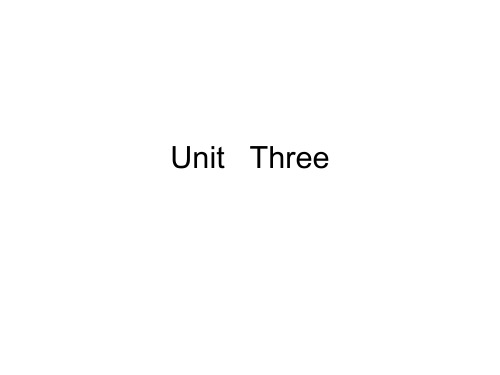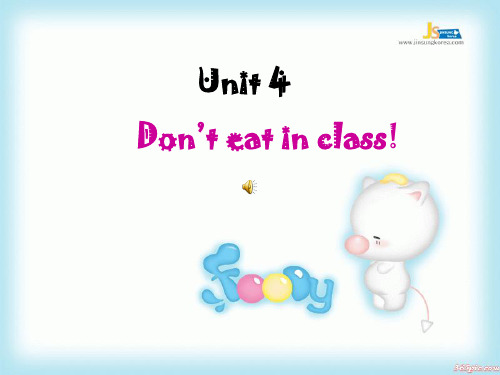人教版七年级英语下册unit 3-4 复习课件
合集下载
人教版七年级英语下册第三单元课件

panda
lion
penguin
giraffe
monkey
Which animal do you want to see first in the zoo?
I want to see the pandas/… first.
Why do you want to sI like them.
A lion
4 . This animal lives only in China . It is black and white . ______
A panda
Guess :which animal is it ?
6. This animal is very tall . It has a very long neck . _______
唱 出 来
Guess :which animal is it ?
1. This animal likes to eat bananas . ________
A monkey
2.This animal is the largest animal on land .(陆地上) _______
An elephant
3 . This animal is from Africa(非洲) . It eats meat . It usually sleeps and relax 20 hours a day . _______
1b
√
√
√
2a
Listen and write the animals you hear. Draw a line from the animals to the description words.
Animals Description words 1.________ a. interesting b. cute 2._______ c. fun d. smart
lion
penguin
giraffe
monkey
Which animal do you want to see first in the zoo?
I want to see the pandas/… first.
Why do you want to sI like them.
A lion
4 . This animal lives only in China . It is black and white . ______
A panda
Guess :which animal is it ?
6. This animal is very tall . It has a very long neck . _______
唱 出 来
Guess :which animal is it ?
1. This animal likes to eat bananas . ________
A monkey
2.This animal is the largest animal on land .(陆地上) _______
An elephant
3 . This animal is from Africa(非洲) . It eats meat . It usually sleeps and relax 20 hours a day . _______
1b
√
√
√
2a
Listen and write the animals you hear. Draw a line from the animals to the description words.
Animals Description words 1.________ a. interesting b. cute 2._______ c. fun d. smart
Unit3+-Unit4+复习课件 人教版七年级英语下册

1.-How do you usually go to school?
-By ___C__bike, but sometimes I take ______bus.
A.a; / B. a; the C. /; the D. /; /
归纳2:提问时间
H__o_w__l_o_n_g_ + does it take sb. to do sth.?句型 How long does it take you to go to school?
Unit3
How do you get to school? Revision
revision
--How do you get to school? --I ride my bike.
ห้องสมุดไป่ตู้
Way
--How long does it take to get to school? --It takes about 20 minutes.
1.It takes Rose about twenty minutes ___C____ to school by bus. A.get B. gets C. to get D. getting 2.It takes ___B__ 25 minutes ________his homework. A. him; to doing B. him; to do C. his; to do D. his; doing
walk to … to
1.到达学校/ 到家 2.在...和...之间 3.他们的梦想成为现实 4.害怕(做)某事 5.某人花费时间做某事 6.步行去…… 7.一个11岁的男孩 8.认为,想起 9.乘铁索过河 10.他对我来说像一位父亲一样 11.骑自行车到学校 12.离学校大约十公里远 13.你觉得怎么样 ? 14.到达学校很容易 15.步行/骑行15分钟的路程
unit 4【复习课件】七年级英语下册单元复习(人教版)

别把脏碗留在厨房里!
10. I can’t relax on weekends __e_it_h_e_r___ _b_e_c_a_u_se___ I have to
learn to play the piano. 周末我也不能放松, 因为我不得不去学习弹钢琴。
重点语法
祈使句
用于表达命令、请求、劝告、警告、禁止等的句子称为 祈使句。祈使句最常用于表达命令。祈使句因对象(即主语) 是第二人称, 所以通常省略主语而以动词原形开头。祈使句句 末使用句号或感叹号。为表示语气委婉, 可在句首或句尾加 please, please放在句尾时, 前面通常加逗号。
Let me help you. 让我来帮你。
重点语法
祈使句
考题:[ 广元] —________ silent, please! You are in the library.
—I’m sorry, madam.
A. Keep
B. To keep
C. Keeping
D. Kept
重点语法
祈使句
否定祈使句的形式:
重点单词
1. rule n. 规则; 规章→____s_c_h_o_o_l_r_u_le_s___学校规则 2. arrive v. 到达→ ___a_r_r_iv_e__in_/_a_t._..__到达……
→ar_r_i_v_e_l_a_te__fo_r__sc_h上oo学l 迟到 3. fight v.& n. 打架; 战斗→ __f_ig_h__t _a_g_a_in_s_t_s_b_.和某人打斗→
→_____fo_l_lo_w__in_g____n. 下列事物
重点单词
30. learn v. 学习; 学会→ _le_a_r_n__to__d_o_s_t_h_.____学习做某事 → ____l_ea_r_n__fr_o_m__s_b_.向某人学习 → ____l_e_a_rn__a_b_o_u_t了解; 获悉
10. I can’t relax on weekends __e_it_h_e_r___ _b_e_c_a_u_se___ I have to
learn to play the piano. 周末我也不能放松, 因为我不得不去学习弹钢琴。
重点语法
祈使句
用于表达命令、请求、劝告、警告、禁止等的句子称为 祈使句。祈使句最常用于表达命令。祈使句因对象(即主语) 是第二人称, 所以通常省略主语而以动词原形开头。祈使句句 末使用句号或感叹号。为表示语气委婉, 可在句首或句尾加 please, please放在句尾时, 前面通常加逗号。
Let me help you. 让我来帮你。
重点语法
祈使句
考题:[ 广元] —________ silent, please! You are in the library.
—I’m sorry, madam.
A. Keep
B. To keep
C. Keeping
D. Kept
重点语法
祈使句
否定祈使句的形式:
重点单词
1. rule n. 规则; 规章→____s_c_h_o_o_l_r_u_le_s___学校规则 2. arrive v. 到达→ ___a_r_r_iv_e__in_/_a_t._..__到达……
→ar_r_i_v_e_l_a_te__fo_r__sc_h上oo学l 迟到 3. fight v.& n. 打架; 战斗→ __f_ig_h__t _a_g_a_in_s_t_s_b_.和某人打斗→
→_____fo_l_lo_w__in_g____n. 下列事物
重点单词
30. learn v. 学习; 学会→ _le_a_r_n__to__d_o_s_t_h_.____学习做某事 → ____l_ea_r_n__fr_o_m__s_b_.向某人学习 → ____l_e_a_rn__a_b_o_u_t了解; 获悉
人教版七年级英语下册unit-3-4-复习课件

句型转换。 3. Do your parents drive to work? (作否定
回答) _N_o_,__th_e_y__d_o_n_’_t.______ 4. Mary goes to school by bike? (划线部分
提问)
_H_o_w__d_o_e_s_M__a_r_y__g_o_t_o_s_c_h_o_o_l_?_______ 5. Linda lives ten kilometers from school.
开头是动词原形。
祈使句有肯定和否定两种: e.g. Look out! 小心!
Wait here for me! 在这等我!
Come in, please! 请进! Sit down, please. 请坐。 Let's go home. 我们回家吧。 否定的祈使句是在动词原形前(即句首)加Don't. e.g. Don't talk in class! 不要在课常上讲话! Don't open the window! 别开窗! Don’t arrive late for school. 上学别迟到 ! Don’t smoke! /No smoking ! 别吸烟!
88eighty-eight 345 three hundred and
99 ninety-nine
forty-five
take在此句中的意思是“花费”
2:10----2:50 / 40 minutes
It takes her about 40 minutes to get to school by bike.
A. Do, does B. Can, do C. Do, can D. Can, can
人教版英语七年级下册Unit4PPT课件

3:remember doing sth记得做过某事(做了)
如: I remember taking a desk to Tom
我记得已经拿给Tom了(已经做过了)
Do you remember __jion my party tomorrow,Alice
I can remember __your party last month.
3: learn from 向。。。学习
如:You should learn from Bob
你应该向Bob学习
4:learn about 学习什么 ,了解什么
如:I want to learn about history
2021/7/23
33
1. have fun玩的开心--have great fun玩的很开心 如:We always have great fun at parties 我们在聚会上总是玩的很开心
2.feel系动词----感受,觉得
feel sb do sth 感到某人做某事}这件事情已经发 生了
feel sth do sth感到某物做某事}这件事情已经发 生了
如:I felt a cat eat my food.(食物已经被吃了)
2021/7/23
25
1. feel sb/sth doing sth感到某人/某物正在做某 事(现在正在做的事情)
:
2:lucky(形容词)幸运的 You are lucky你是幸运的
3:unlucky(形容词)不幸运的
2021/7/23
30
1. keep (v) 使....保持
keep sb /sth +形容词/介词短语
表示:某人或某物保持某个状态
新人教版七下Units3-4复习课件

• • • • • • • •
Make one’s bed Listen to music Good luck Have to Noisy Practice Go out Music player
Task one : Combing knowledge of units3&4
(梳理第三,四单元知识)
3. Let us go swimming, _____?
C. won’t you
句型大闯关 单项选择。
“学以致用”,你真的会用了
吗?
1. —Can you cook fish?
— ____. B It’s easy. A.No, I can’t C. Sorry, I can’t B. Yes, I can D. Yes, I need
2. Please _____ B some books here for me. A. take B.bring C.give D.talk 3. It's raining, so we ______ D stay at home.
A.can
B.must
C.may
D.have to
too many
语法加油站
单项选择
学以致用,你掌握了吗?
1. —_____ does your mother go to work every day? —By bike.
A. Why
B. Where
C. How
D. What
2. —_____does it take you to do your homework every day? —About an hour.
Requirement:
1. Prepare in groups 2. group1--------unit 3 group2--------unit 4
人教版七年级下册英语RJ精品教学课件 Unit 3 第4课时 Section B (1a-1e)

Roleplay
How do you get to school?
I usually take the subway near my school first and then walk there for five minutes.
How do you get to school?
I ride my bike to the station first, then take the bus to the school .
weekend.
think of
n
3. It is not far from the school to the bus
s___________.
4. What do you _________(认为) our school?
Ⅱ.翻译句子。 1. —你怎么去学校?
—我骑自行车到地铁站,然后乘坐地铁。
1 Listen again. How does Bob get to his d grandparents’ home? Check (√) 1 or 2.
√
Mary: I love your home, Bob. It’s so big! Bob: Thanks, Mary. My grandparents’ home is very Mary: big, too. Bob: Where do they live? Mary: Very far from my home. Bob: Oh, how far? Mary: It’s about 500 kilometers from here.
1 Listen and check (√) the things that Mary wants c to know?
人教版七年级英语下册Unit4复习课件

—Do my homework, of course.
A. What
B. When
C. Where D. How
4. —
late for school again.
—Sorry, I won’t.
A. Not be B. Don’t be C. Not D. Don’t
5. Which of the following pictures means“Please be quiet”?
【用法辨析】listen与hear的区别
【活学活用】
Байду номын сангаас
①听! 你能听见汤姆正在唱歌吗?
! Can you
Tom singing now?
②不要在会上听收音机。
Don’t
the radio in the meeting.
答案: ①Listen; hear ②listen to
4. We can’t wear a hat in our school. 在我们学校里不允许戴帽子。 【自主领悟】wear“穿; 戴”, 表示状态。相当于be in。例如: He is wearing a black T-shirt. 他穿着一件黑色的T恤衫。
【归纳拓展】before的其他用法
【活学活用】
①She always says goodbye to her mother before
(go)to school.
②He always washes his feet
he goes to bed.
A. after
B. because
C. if
D. before
his workers and he is
also strict
- 1、下载文档前请自行甄别文档内容的完整性,平台不提供额外的编辑、内容补充、找答案等附加服务。
- 2、"仅部分预览"的文档,不可在线预览部分如存在完整性等问题,可反馈申请退款(可完整预览的文档不适用该条件!)。
- 3、如文档侵犯您的权益,请联系客服反馈,我们会尽快为您处理(人工客服工作时间:9:00-18:30)。
I get to school on foot every day. 3. They go to the USA by plane. They take the plane to the USA.
句型转换。
1. They ride their bikes to school. (就画线部分提问)
____ ___ How do ____ they get to school?
Unit
Four
复习检测:
外出 ___ 看朋友___ 做他的作业___ 练习吉他___ 洗碗___ 看电视___ 帮助他的妈妈做早饭___ 打扫他的房间___ go out see friends do his homework practice the guitar do the dishes watch TV help his mom make breakfast clean his room
3 points
翻译短语(5秒)
1.和某人打架
fight with sb.
2. 不许说话 3. 上课迟到
No talking
arrive late for school/ be late for school
Ⅳ. 汉译英 8’ (30秒)
1. 外面很冷, 你必须穿大衣。 2. 你必须十一点前上床睡觉吗? Do you have to ___ ______ _____ 11:00? go _____ to bed between 3. 你认为你的英语课怎么样? 4. 我们不能在教室里吃东西。 We can’t _____ __________. eat in the classrooms
4. How far is your homefrom ____ the bus station? ride
写出下列句子的同义句。 1. Tom takes the bus to school.
Tom gets to school by bus. 2. I walk to school every day.
It is about 140 km from Beijing to Tianjin.
How far is it from Beijing to Tianjin?
Fill in the blanks with the right form of the words, then make your own sentences: ride take from think of get to
be _______ late for class. Don’t ______
Fill in the blank of school rules:
1. Don’t _________late arrive for class/school. 2. ______eat Don’t in class. 3. Don’t run_______________. in the hallways 4. Clean _____ the classroom after class. can’t play basketball 5. We ____________________ in class. 6.Wehave ______ to wear the school uniform
Practice:
1. 把下列祈使句改成否定句
1. Sit down. Don’t sit down. 2. Come in. Don’t come in. 3. Eat at home. Don’t eat at home.
4. Listen to music outside. Don’t listen to music outside. 5. Do your homework at school. Don’t do your homework at school.
joins a has to get up _____ early the next morning. She ____
practice her guitar every music club. She has to ________ lucky day. She doesn’t think she’s ______.
2. It takes 50 minutes to get here. (就画线部分提问) _____ How ____ long does ____ it take to get here?
句型转换。 3. Do your parents drive to work? (作否定 回答) ___________________ No, they don’t. 4. Mary goes to school by bike? (划线部分 提问) ________________________________ How does Mary go to school? 5. Linda lives ten kilometers from school. ( 划线部分提问) ________________________________? How far does Linda live from school
Emily has so many _____. rules She has to do her
after school. She can’t go out ______ on homework ______
school nights. She has to wash the dishes after
for dinner, then she can watch TV _____ half an hour. reading She usually reads at night. She She likes _______. has to be in bed between _____ ten o’clock because she
1. _______ fight with others. A. Not B. No C. Don’t D. Doesn’t
2.---_____we eat in the dining hall? ---Yes, we_____
A. Do, does
B. Can, do C. Do, can D. Can, can
and fifty-eight 200 two hundred 345 three hundred and forty-five
take在此句中的意思是“花费”
2:10----2:50 / 40 minutes
It takes her about 40 minutes to get to school by bike.
3. You can’t eat _____ outside.
A. at
B. \
C. in
D. on
4.Listen to music in hallways.(改为否定句) Don’t listen to music in hallways. 5.Don’t arrive late for class.(改为同义句)自行车 1.ride a bike = by bike 2. take the subway = by subway 乘坐地铁 3. take the train = by train 乘坐火车 4. take a plane = by plane 乘坐飞机 5. take the bus = by bus 乘坐公交车 6. walks = on foot 走路、步行 7. get to 到达
Let's go home. 我们回家吧。
否定的祈使句是在动词原形前(即句首)加Don't. e.g. Don't talk in class! 不要在课常上讲话!
Don't open the window! 别开窗! Don’t arrive late for school. 上学别迟到 ! Don’t smoke! /No smoking ! 别吸烟!
Grammar
1. 祈使句是表示请求、命令、叮嘱、号召、
劝告等的句子; 通常省略主语you; 句中谓语
动词用动词原形; 句尾一般用降调; 祈使句的
开头是动词原形。
祈使句有肯定和否定两种: e.g. Look out! 小心! Wait here for me! 在这等我!
Come in, please! 请进! Sit down, please. 请坐。
get to school in the 1. How do you _________ morning? think of the transportation 2. What do you _________ in your home town?
3. When it rains I _____ take a taxi .
have ____ to wear your co It’s cold _________ outside . You _____
think ______ of What do you _______ your English class?
rule, practice, join, after, lucky, for, on, read, before, early
A: How long does it take? B: It takes 25 minutes. 省略了me
花费多长时间?
140 kilometers
Beijing is about 140 km away远 from Tianjin.
How far is Beijing from Tianjin?
Ⅲ. Form sentences. 组句
1. late, don't, for school, arrive Don’t arrive late for school. 2. music, listen to, in the classroom, don't Don’t listen to music in the classroom. 3. eat, can't, in the classroom, we We can’t eat in the classroom.
句型转换。
1. They ride their bikes to school. (就画线部分提问)
____ ___ How do ____ they get to school?
Unit
Four
复习检测:
外出 ___ 看朋友___ 做他的作业___ 练习吉他___ 洗碗___ 看电视___ 帮助他的妈妈做早饭___ 打扫他的房间___ go out see friends do his homework practice the guitar do the dishes watch TV help his mom make breakfast clean his room
3 points
翻译短语(5秒)
1.和某人打架
fight with sb.
2. 不许说话 3. 上课迟到
No talking
arrive late for school/ be late for school
Ⅳ. 汉译英 8’ (30秒)
1. 外面很冷, 你必须穿大衣。 2. 你必须十一点前上床睡觉吗? Do you have to ___ ______ _____ 11:00? go _____ to bed between 3. 你认为你的英语课怎么样? 4. 我们不能在教室里吃东西。 We can’t _____ __________. eat in the classrooms
4. How far is your homefrom ____ the bus station? ride
写出下列句子的同义句。 1. Tom takes the bus to school.
Tom gets to school by bus. 2. I walk to school every day.
It is about 140 km from Beijing to Tianjin.
How far is it from Beijing to Tianjin?
Fill in the blanks with the right form of the words, then make your own sentences: ride take from think of get to
be _______ late for class. Don’t ______
Fill in the blank of school rules:
1. Don’t _________late arrive for class/school. 2. ______eat Don’t in class. 3. Don’t run_______________. in the hallways 4. Clean _____ the classroom after class. can’t play basketball 5. We ____________________ in class. 6.Wehave ______ to wear the school uniform
Practice:
1. 把下列祈使句改成否定句
1. Sit down. Don’t sit down. 2. Come in. Don’t come in. 3. Eat at home. Don’t eat at home.
4. Listen to music outside. Don’t listen to music outside. 5. Do your homework at school. Don’t do your homework at school.
joins a has to get up _____ early the next morning. She ____
practice her guitar every music club. She has to ________ lucky day. She doesn’t think she’s ______.
2. It takes 50 minutes to get here. (就画线部分提问) _____ How ____ long does ____ it take to get here?
句型转换。 3. Do your parents drive to work? (作否定 回答) ___________________ No, they don’t. 4. Mary goes to school by bike? (划线部分 提问) ________________________________ How does Mary go to school? 5. Linda lives ten kilometers from school. ( 划线部分提问) ________________________________? How far does Linda live from school
Emily has so many _____. rules She has to do her
after school. She can’t go out ______ on homework ______
school nights. She has to wash the dishes after
for dinner, then she can watch TV _____ half an hour. reading She usually reads at night. She She likes _______. has to be in bed between _____ ten o’clock because she
1. _______ fight with others. A. Not B. No C. Don’t D. Doesn’t
2.---_____we eat in the dining hall? ---Yes, we_____
A. Do, does
B. Can, do C. Do, can D. Can, can
and fifty-eight 200 two hundred 345 three hundred and forty-five
take在此句中的意思是“花费”
2:10----2:50 / 40 minutes
It takes her about 40 minutes to get to school by bike.
3. You can’t eat _____ outside.
A. at
B. \
C. in
D. on
4.Listen to music in hallways.(改为否定句) Don’t listen to music in hallways. 5.Don’t arrive late for class.(改为同义句)自行车 1.ride a bike = by bike 2. take the subway = by subway 乘坐地铁 3. take the train = by train 乘坐火车 4. take a plane = by plane 乘坐飞机 5. take the bus = by bus 乘坐公交车 6. walks = on foot 走路、步行 7. get to 到达
Let's go home. 我们回家吧。
否定的祈使句是在动词原形前(即句首)加Don't. e.g. Don't talk in class! 不要在课常上讲话!
Don't open the window! 别开窗! Don’t arrive late for school. 上学别迟到 ! Don’t smoke! /No smoking ! 别吸烟!
Grammar
1. 祈使句是表示请求、命令、叮嘱、号召、
劝告等的句子; 通常省略主语you; 句中谓语
动词用动词原形; 句尾一般用降调; 祈使句的
开头是动词原形。
祈使句有肯定和否定两种: e.g. Look out! 小心! Wait here for me! 在这等我!
Come in, please! 请进! Sit down, please. 请坐。
get to school in the 1. How do you _________ morning? think of the transportation 2. What do you _________ in your home town?
3. When it rains I _____ take a taxi .
have ____ to wear your co It’s cold _________ outside . You _____
think ______ of What do you _______ your English class?
rule, practice, join, after, lucky, for, on, read, before, early
A: How long does it take? B: It takes 25 minutes. 省略了me
花费多长时间?
140 kilometers
Beijing is about 140 km away远 from Tianjin.
How far is Beijing from Tianjin?
Ⅲ. Form sentences. 组句
1. late, don't, for school, arrive Don’t arrive late for school. 2. music, listen to, in the classroom, don't Don’t listen to music in the classroom. 3. eat, can't, in the classroom, we We can’t eat in the classroom.
